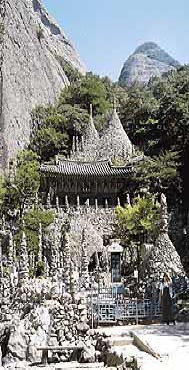|
||||||
|
History
The Prehistoric Age
Archaeological findings have indicated that the first settlements on the Korean Peninsula occurred 700,000 years ago
Go-Joseon (2333 - 108 B.C)
According to legend, the mythical figure Dan-gun founded Go-Joseon, the first Korean Kingdom, in 2333 B.C. Subsequently, several tribes moved from the southern part of Manchuria to the Korean Peninsula.
The Three Kingdoms Period (57 B.C. - A.D. 676)
The three kingdoms, Goguryeo, Baekje and Silla, were established in the 1st century A.D. During this period, the kingdom's political systems, religions (Buddhism and Confucianism), and cultures developed.
The Unified Silla Kingdom (676 - 935)
The Unified Silla Kingdom promoted the development of culture and arts, and the popularity of Buddhism reached its peak during this period. The Unified Silla Kingdom declined because of contention for supremacy among the noble classes, and was annexed by Goryeo in 935.
|
|
|
The Goryeo Dynasty (918 - 1392)
The Goryeo Dynasty was established in 918. Buddhism became the state religion during this time and greatly influenced politics and culture. Famous items produced during this time include Goryeo celadon and the Tripitaka Koreana. During the Goryeo Dynasty, Jikji, the world's oldest movable metal type was invented. It was invented 78 years before the German movable metal type created by Gutenburg. The Goryeo Dynasty's strength decreased gradually in the latter half of the 14th century.
The Joseon Dynasty (1392 - 1910)
The Joseon Dynasty was formed at the end of the 14th century. Confucianism became the state ideology and exerted a massive influence over the whole of society. The Joseon Dynasty produced Hangeul, the Korean alphabet, which was invented in 1443, during the reign of King Sejong. The dynasty's power declined sharply later because of foreign invasions, beginning with the Japanese invasion of 1592.
The Japanese Colonial Period (1910 - 1945)
In 1876, the Joseon Dynasty was forced to adopt an open-door policy regarding Japan. The Japanese annexation of Korea concluded in 1910, and Korean people had to accept Japanese colonial rule until the surrender of Japan, which ended World War II.
The Republic of Korea (1945 - Present)
In 1945, Japan surrendered to the Allies and withdrew from the Korean Peninsula. The Korean Peninsula was then divided into two zones, South and North Korea. The Korean War broke out on June 25, 1950 and fighting ended when an armistice was signed on July 27, 1953. In 2000, an historic summit took place between South and North Korea in Pyeongyang, the capital of North Korea. |
|


